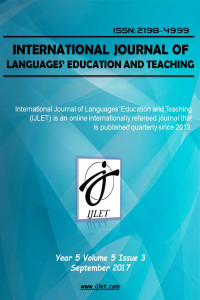The Attitude of Students Who Are Native Speakers of Turkish in England towards Turkish Lessons Based on Their Demographic Characteristics
Öz
Anahtar Kelimeler
Turkish teaching bilingualism migration mother tongue England
Kaynakça
- Adıgüzel, Y. (2007). Cultural Identity Perception of Turkish Origins in Germany and England 38. ICANAS International Congress on Asia and North Africa Studies. Ankara: Atatürk Kültür, Dil ve Tarih Yüksek Kurumu.
- Aksan, D. (1998). Language in all directions- Linguistics with Main Lines. Ankara: Türk Dil Kurumu.
- Aşçı, U. D. (2013). Bilingualism and Language Confusion in the Turkish Speaking Society in England. Bülent Gül (Ed.). Bengü Bitig Ahmet Bican Ercilasun Armağanı (s. 101- 107). Ankara: Türk Kültürü ve Araştırmaları Enstitüsü.
- Atay, T. (2006). Turks, Kurds, Cypriots, Living in Turkish in the UK. Ankara: Dipnot.
- Ateşal, Z. (2014). 8-10. Compliance of Class Turkish and Turkish Culture Course Book to Target Age Level. Turkophone, 1 (1), 62-73.
- Citizenship Services. (2015). http://www.turkishconsulate.org.uk/tr/vatandaslik.asp (Accessed: 21.04.2017).
- Güzel, A. (2010). Teaching Turkish to Bilingual Turkish Children (Germany Example). Ankara: Öncü.
- Haskara, İ. (1996). Bilingualism-Multilingualism. Dil Dergisi, 42, 22-24.
- Little Turkey in Great Britain. (2004). http://www.aksiyon.com.tr/dunya/londradaki-kucuk-turkiye_514788 (Accessed: 19.05.2017).
- Şen, Ü. (2011). Attitudes towards Turkish Language of Turkish Children Living in Belgium and Their Writing Abilities. Doctoral dissertation. Gazi University.
- Targets and Aims. (2013). http://turkishschools.co.uk/BusinessPlan.pdf (Accessed: 07.05.2017)
- Yıldız, C. (2012). Turkish Language Education for Turkish Children Living Abroad. Ankara: Yurtdışı Türkler ve Akraba Topluluklar Başkanlığı.
- Workshop on Turkish Society in Britain. (2011). http://www.meblem.org.uk/formlar/1.%20%C4%B0ngiltere%20T%C3%BCrk%20Toplumu%20E%C4%9Fitim%20%C3%87al%C4%B1%C5%9Ftay%C4%B1%20Kararlar%C4%B1.pdf (Accessed: 19.05.2017)
The Attitude of Students Who Are Native Speakers of Turkish in England towards Turkish Lessons Based on Their Demographic Characteristics
Öz
Mother tongue education plays quite a significant role in individual students’ success in both social and academic areas. A qualified mother tongue education is crucial in ensuring those students become successful adults in their later life and adopt their own culture and identities. From time to time, there might be students who have mother tongue medium education along with those who have other languages as the medium of instruction. Among those bilingual students there are children of Turkish citizens who immigrated to Western Europe as workers. Mother tongue education is a necessity for bilingual individuals to protect their identities, to adopt to the society they already live in and to learn the language used in that very society much more easily. This makes it more important for the bilingual Turkish children living in foreign countries to receive mother tongue education. In this vein, the attitudes of Turkish students, who live in England, towards the Turkish language class are examined. 105 Turkish students between 11 and 18 years enrolled in Wisdom and Namık Kemal Turkish School in the UK were requested to fill in a questionnaire. Based on their responses, their opinions about the Turkish language class were evaluated. In the study, the effect of demographic characteristics (age, gender, place of birth, place of birth of the mother and father) on attitudes towards Turkish class was examined.
Anahtar Kelimeler
Turkish teaching bilingualism migration mother tongue England
Kaynakça
- Adıgüzel, Y. (2007). Cultural Identity Perception of Turkish Origins in Germany and England 38. ICANAS International Congress on Asia and North Africa Studies. Ankara: Atatürk Kültür, Dil ve Tarih Yüksek Kurumu.
- Aksan, D. (1998). Language in all directions- Linguistics with Main Lines. Ankara: Türk Dil Kurumu.
- Aşçı, U. D. (2013). Bilingualism and Language Confusion in the Turkish Speaking Society in England. Bülent Gül (Ed.). Bengü Bitig Ahmet Bican Ercilasun Armağanı (s. 101- 107). Ankara: Türk Kültürü ve Araştırmaları Enstitüsü.
- Atay, T. (2006). Turks, Kurds, Cypriots, Living in Turkish in the UK. Ankara: Dipnot.
- Ateşal, Z. (2014). 8-10. Compliance of Class Turkish and Turkish Culture Course Book to Target Age Level. Turkophone, 1 (1), 62-73.
- Citizenship Services. (2015). http://www.turkishconsulate.org.uk/tr/vatandaslik.asp (Accessed: 21.04.2017).
- Güzel, A. (2010). Teaching Turkish to Bilingual Turkish Children (Germany Example). Ankara: Öncü.
- Haskara, İ. (1996). Bilingualism-Multilingualism. Dil Dergisi, 42, 22-24.
- Little Turkey in Great Britain. (2004). http://www.aksiyon.com.tr/dunya/londradaki-kucuk-turkiye_514788 (Accessed: 19.05.2017).
- Şen, Ü. (2011). Attitudes towards Turkish Language of Turkish Children Living in Belgium and Their Writing Abilities. Doctoral dissertation. Gazi University.
- Targets and Aims. (2013). http://turkishschools.co.uk/BusinessPlan.pdf (Accessed: 07.05.2017)
- Yıldız, C. (2012). Turkish Language Education for Turkish Children Living Abroad. Ankara: Yurtdışı Türkler ve Akraba Topluluklar Başkanlığı.
- Workshop on Turkish Society in Britain. (2011). http://www.meblem.org.uk/formlar/1.%20%C4%B0ngiltere%20T%C3%BCrk%20Toplumu%20E%C4%9Fitim%20%C3%87al%C4%B1%C5%9Ftay%C4%B1%20Kararlar%C4%B1.pdf (Accessed: 19.05.2017)
Ayrıntılar
| Birincil Dil | İngilizce |
|---|---|
| Konular | İkinci Bir Dil Olarak İngilizce, Dil Çalışmaları (Diğer) |
| Bölüm | Araştırma Makalesi |
| Yazarlar | |
| Yayımlanma Tarihi | 30 Eylül 2017 |
| Yayımlandığı Sayı | Yıl 2017 Cilt: 5 Sayı: 3 |

